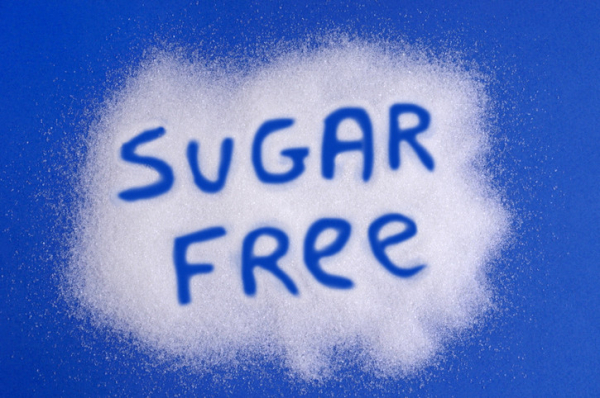
How healthy is sugar alcohol?

If you are trying to cut back on added sugar — and you should, because excess sugar increases risks for obesity, diabetes, and heart disease — you might be tempted by products advertised as low sugar, no sugar, or sugar-free.
Many contain familiar low-calorie sugar substitutes like aspartame or sucralose instead of sugar. And as you’re reading labels, you also may run across another ingredient: sugar alcohol, which is used in products like sugar-free cookies, candies, ice cream, beverages, and chewing gums. Are any of these sweeteners a better choice nutritionally? Dr. Frank Hu, professor of nutrition and epidemiology with the Harvard T.H. Chan School of Public Health, weighs in below.
Are low-calorie or no-calorie sweeteners any healthier than natural sugar?
Also known as artificial sweeteners or sugar substitutes, the list of low-calorie and no-calorie sweeteners you may see on product nutrition labels includes acesulfame-K, saccharin, sucralose, neotame, and advantame. These have a higher sweetness intensity per gram than natural sugar.
So far research on them is mixed, although some observational studies have found that beverages containing low-calorie sweeteners are associated with a higher risk for diabetes and weight gain.
What exactly are sugar alcohols and how can you spot them?
Sugar alcohols may have the most misleading name, as they are neither sugar nor alcohol, according to Dr. Hu. “They are a type of carbohydrate derived from fruits and vegetables, although most commercial sugar alcohols are synthetically produced.”
You can usually spot many sugar alcohols on ingredient lists by “-ol” at the ends of their names. Examples include sorbitol, xylitol, lactitol, mannitol, erythritol, and maltitol.
Are sugar alcohols any healthier than other sugar substitutes or natural sugar?
Here is a look at the pros and cons.
The upside of sugar alcohols
Sugar alcohols reside in the sweet spot between natural sugar and low-calorie sweeteners. They are not as overly sweet as sweeteners and don’t add too many extra calories like sugar.
“Sugar alcohols are about 40% to 80% as sweet as natural sugar, whereas artificial sweeteners like aspartame are about 200 times sweeter,” says Dr. Hu. “And they have about 25% to 75% fewer calories per gram than sugar.”
Another upside of sugar alcohols is that they break down slowly in the gut. Hence, your body only absorbs part of their overall carbohydrates. “This keeps your blood sugar and insulin levels from spiking as they do with sugar,” says Dr. Hu. “That makes them a useful sugar substitute for people with diabetes.”
The downside of sugar alcohols
The main downside to sugar alcohols is this: when taken in high amounts they can cause gastrointestinal (GI) problems, such as abdominal pain, diarrhea, or loose stools.
Because sugar alcohols are slowly digested, they have more time to feed bacteria in the gut, which can lead to fermentation and produce excess gas. Their slow digestion also can pull extra water into the colon and cause a laxative effect.
People’s tolerance for sugar alcohols depends on many factors, including body weight, health conditions, and the amount and types of sugar alcohols. “Individual differences in digestion and metabolism, gut microbiome composition, and dietary habits can also make a difference,” says Dr. Hu. “For these reasons, we recommend introducing sugar alcohols into your diet gradually and observing how your body responds.”
For people who experience GI symptoms caused by sugar alcohols, Dr. Hu says cutting back on the amount of foods and drinks made with them often can correct the problem. “Sugar alcohols are commonly found in sugar-free or low-carb products, so pay attention to food labels” he says. “Because different sugar alcohols can have different effects, it might be useful to identify specific types of sugar alcohols that cause GI side effects.”
Do sugar alcohols have health risks?
Possible long-term health risks of sugar alcohol are still being explored. A 2023 observational study found a link between using erythritol as an added sweetener and cardiovascular disease events, such as stroke and heart attack, in people with heart disease or who had risk factors like diabetes and high blood pressure. However, these findings have not been confirmed in subsequent studies.
“Sugar alcohols offer a healthier alternative to sugar because of their lower calorie content and reduced glycemic response, which is the effect food has on blood sugar levels,” says Dr. Hu. “But they also have potential drawbacks, especially for those with sensitive digestive systems, so it’s best to consume them in moderation as part of an overall healthy eating pattern.”
About the Author

Matthew Solan, Executive Editor, Harvard Men's Health Watch
Matthew Solan is the executive editor of Harvard Men’s Health Watch. He previously served as executive editor for UCLA Health’s Healthy Years and as a contributor to Duke Medicine’s Health News and Weill Cornell Medical College’s … See Full Bio View all posts by Matthew Solan
About the Reviewer

Howard E. LeWine, MD, Chief Medical Editor, Harvard Health Publishing
Dr. Howard LeWine is a practicing internist at Brigham and Women’s Hospital in Boston, Chief Medical Editor at Harvard Health Publishing, and editor in chief of Harvard Men’s Health Watch. See Full Bio View all posts by Howard E. LeWine, MD

The art of a heartfelt apology

If you’ve been stuck mostly at home with one or more family members over the past year, chances are you’ve gotten on one another’s nerves occasionally. When you’re under a lot of stress, it’s not uncommon say something unkind, or even to lash out in anger to someone you care about. And we all make thoughtless mistakes from time to time, like forgetting a promise or breaking something.
Not sure if you should apologize?
Even if you don’t think what you said or did was so bad, or believe that the other person is actually in the wrong, it’s still important to apologize when you’ve hurt or angered someone. “To preserve or re-establish connections with other people, you have to let go of concerns about right and wrong and try instead to understand the other person’s experience,” says Dr. Ronald Siegel, assistant professor of psychology at Harvard Medical School. That ability is one of the cornerstones of emotional intelligence, which underlies healthy, productive relationships of all types.
How to apologize genuinely
For an apology to be effective, it has to be genuine. A successful apology validates that the other person felt offended, and acknowledges responsibility (you accept that your actions caused the other person pain). You want to convey that you truly feel sorry and care about the person who was hurt, and promise to make amends, including by taking steps to avoid similar mishaps going forward as in the examples below.
According to the late psychiatrist Dr. Aaron Lazare, an apology expert and former chancellor and dean of the University of Massachusetts Medical School, a good apology has four elements:
- Acknowledge the offense. Take responsibility for the offense, whether it was a physical or psychological harm, and confirm that your behavior was not acceptable. Avoid using vague or evasive language, or wording an apology in a way that minimizes the offense or questions whether the victim was really hurt.
- Explain what happened. The challenge here is to explain how the offense occurred without excusing it. In fact, sometimes the best strategy is to say there is no excuse.
- Express remorse. If you regret the error or feel ashamed or humiliated, say so: this is all part of expressing sincere remorse.
- Offer to make amends. For example, if you have damaged someone’s property, have it repaired or replace it. When the offense has hurt someone’s feelings, acknowledge the pain and promise to try to be more sensitive in the future.
Making a heartfelt apology
The words you choose for your apology count. Here are some examples of good and bad apologies.
|
EFFECTIVE WORDING |
WHY IT WORKS |
|
“I’m sorry I lost my temper last night. I’ve been under a lot of pressure at work, but that’s no excuse for my behavior. I love you and will try harder not to take my frustrations out on you.” |
Takes responsibility, explains but does not excuse why the mistake happened, expresses remorse and caring, and promises reparation. |
|
“I forgot. I apologize for this mistake. It shouldn’t have happened. What can I do to avoid this problem in the future?” |
Takes responsibility, describes the mistake, makes the person feel cared for, and begins a conversation about how to remedy the error. |
|
INEFFECTIVE WORDING |
WHY IT WON’T WORK |
|
“I apologize for whatever happened.” |
Language is vague; offense isn’t specified. |
|
“Mistakes were made.” |
Use of passive voice avoids taking responsibility. |
|
“Okay, I apologize. I didn’t know this was such a sensitive issue for you.” |
Sounds grudging, thrusts the blame back on to the offended person (for “sensitivity”). |
About the Author

Julie Corliss, Executive Editor, Harvard Heart Letter
Julie Corliss is the executive editor of the Harvard Heart Letter. Before working at Harvard, she was a medical writer and editor at HealthNews, a consumer newsletter affiliated with The New England Journal of Medicine. She … See Full Bio View all posts by Julie Corliss
About the Reviewer

Howard E. LeWine, MD, Chief Medical Editor, Harvard Health Publishing
Dr. Howard LeWine is a practicing internist at Brigham and Women’s Hospital in Boston, Chief Medical Editor at Harvard Health Publishing, and editor in chief of Harvard Men’s Health Watch. See Full Bio View all posts by Howard E. LeWine, MD